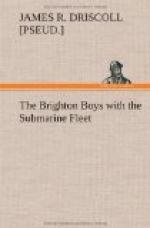Again “Roosey” spoke, and this time with an emphatic “crack” that boded ill for any luckless human who might get within the line of its screaming shell fire.
“O-o-o-oh, great!” cried Lieutenant McClure an instant later as he peered more intently through his glasses.
Of a sudden the periscope disappeared from the crest of the sea as though wiped out completely by the explosion of the Dewey’s shell.
“No doubt of it, boys; you ripped off that periscope,” announced McClure, with an air of finality.
At their commander’s words the gun crew burst into cheers. The submersible’s wireless was singing out a message of good cheer to the American fleet. It was only too evident that the enemy U-boat had been crippled and put completely to rout by the daring maneuvers and deadly gunfire of the Dewey.
“Who said the Yanks couldn’t stop their pesky undersea wasps?” chattered Bill Witt joyously. “If they just let us loose long enough we’ll show ’em how to kill poison with poison.”
Mike Mowrey was in great glee.
“Just like a grasshopper begging for mercy on a bass hook,” he said jauntily, imitating with a crook of his finger the disappearing periscope.
Soon the fleet was off Cape Clear on the southernmost point of the Irish coast and very shortly headed well into the English Channel. Now every few hours the American warships were speaking one or other of the English and French patrol ships. Great was the joy of the boys aboard the Dewey when first they beheld an American destroyer out on the firing line.
“Union Jack and French tricolor look pretty good; but none of them makes a fellow’s blood tingle like the Stars and Stripes; eh, chum?” queried Jack, as he surveyed an American destroyer dashing along in fine fettle. And Ted heartily agreed.
Off Falmouth, the transports, accompanied by three of the American destroyers and two English “limeys “—–as the British destroyers are known in the slang of the sea—–slipped off silently into the twilight. The American infantry and marines were to be landed “somewhere in France.” Jack and Ted viewed the departure with mingled pride and regret.
“Reckon they will be in the trenches before long,” ventured Ted.
“Frisking bean balls at the Fritzes,” snapped Bill Witt with a chuckle as he joined his mates.
And now the submarine fleet continued on its way into the North Sea. An American destroyer, two English “limeys” and a French vessel of the same type were to escort the Yankee subs the rest of the way. By morning the Dewey had slipped through the Strait of Dover and emerged at last into the North Sea—–the field of her future activities!
There, in due time, the subs reported to the American admiral. Without any delay they were detailed for duty in the vast arena stretching down the Strait of Dover northward to the Norwegian coast—–from Wilhelmshaven to the east coast of England and Scotland.




